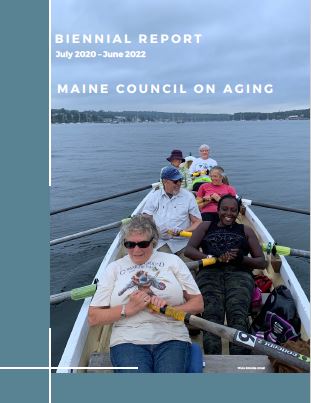What We Believe
We believe in a Maine where we can live healthy, engaged, and secure lives with choices and opportunities as we age in our homes and communities. This vision intentionally includes diverse older people who have experienced historical bias and injustice.
MCOA Mission
The MCOA draws upon wisdom, experience, and data to influence policy, educate stakeholders, and advance initiatives that move us towards our vision. We commit to including the voices, wisdom, and lived experience of diverse older people.
Goals
We support public policy that:
- Creates age equity* across all systems;
- Promotes equity for diverse older people;
- Addresses historical structural inequities;
- Supports municipal and community initiatives that expand meaningful options for us to live healthy, engaged, secure lives, and access the housing, transportation, care and other supports we need;
- Ensures adequate funding and system resources are dedicated to the full spectrum of supports and services for us as we age;
- Expands supports for informal care partners;
- Enhances opportunity for us to work, socialize and be fully engaged in our communities;
- Increase advocacy skills and leadership opportunities;
- Ensures dignity, self-determination, and quality of life; and
- Anticipates emerging trends and changing needs regarding the future of aging in Maine;
*The term “equity” refers to fairness and justice as is distinguished from equality. Equality means treating everyone the same, even when we do actually have difference. Equity acknowledges difference, and recognizes we do not all start from the same place and may need different adjustments to address imbalances. The process is ongoing, requiring us to identify and overcome intentional and unintentional barriers.
Acknowledgements
In America and Maine, policies, structures, and systems exist that deny people and communities of color what is necessary for a full and fair life. Since their inception, these structurally racialized systems have been marked by conscious and unconscious racial bias that pervades our society, to the benefit of white people and to the disadvantage of people of color.
Bias and structural oppression based on factors such as gender or gender identity, immigration status or nationality, age, disability, religion, poverty and social class, sexual orientation, membership in an Indigenous (native) group or ethnicity are equally harmful to people, communities, and the notion of a just society. Further, the damaging effects of oppression are multiplied when these identity factors exist together.
Progress toward justice and equity has largely come from the wisdom and courage of people from communities most harmed by bias and systemic oppression. Thus, our equity work must be pursued in partnership with, and guidance from older BIPOC and LGBTQ+ people.
Our Commitment to Equity & Inclusion
The Maine Council on Aging recognizes and celebrates the rich diversity and extensive experience of older people in Maine. As an advocacy and policy organization dedicated to ensuring that we can all live healthy, engaged, and secure lives as we age, we acknowledge that older people who experience systemic bias and economic injustice during their lives because of their race, ethnicity, gender, gender identity, sexual orientation, ability, age, and national origin often have fewer resources and limited choices and opportunities later in life than those who do not. We strive to understand how systemic and institutional bias have impacted older Mainers and integrate what we learn into all aspects of our work. To this end, we commit to:
- Center Equity: We will center equity as a core value of our work, taking steps to deepen our understanding of systemic barriers and working with partners across Maine to identify ways to dismantle these barriers and increase equitable opportunities for all.
- Advocate for Equitable Policies: We will advocate for policies and practices that address and rectify historical and ongoing inequities faced by older people. In doing this, we commit to listening to those who are impacted and engaging them in crafting the policies and practices we advocate for.
- Inclusive Practices: We will seek out and incorporate diverse perspectives and experiences into our work.
- Education and Awareness: We will engage in education and awareness about the specific challenges faced by older people who experience systemic bias, elevating their voices in our advocacy efforts.
- Continuous Improvement: We will regularly assess our practices and policies to ensure that they align with our commitment to diversity, equity and inclusion, and we will strive for continuous improvement to better advocate for the needs of all older adults.

MCOA 2022 Biennial Report
Download Here
Supporting healthy aging initiatives through shared learningMCOA’s top priorities include:
- Ending ageism by 2032
- Building equitable systems of care
- Strengthening Maine’s direct care workforce across all settings
- Increasing housing, home repair and transportation options
- Expanding equitable access to supports and services
- Promoting integrated and coordinated care
- Increasing the food and financial stability of older Mainers
For its members—now over 135 organizations, MCOA provides a strong network with opportunities for shaping aging policy, shared knowledge, a cohesive voice for advocacy on priority initiatives on aging and shared learning. We host engaging quarterly meetings with frequent presentations, and exciting events like the annual Maine Wisdom Summit.

